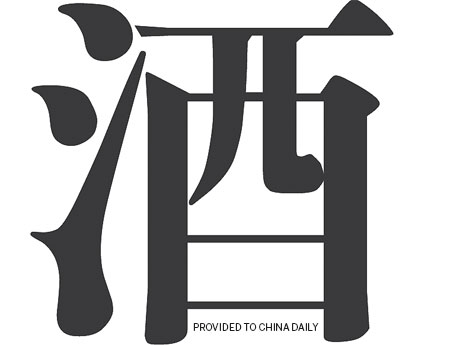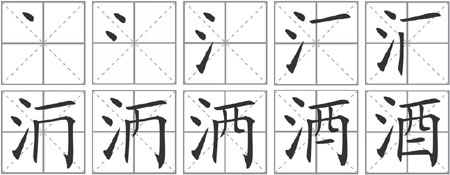Fermentation of a character
Updated: 2013-03-22 16:26
By Laohuang and Xiao Chu (China Daily)
|
||||||||


Jiu (酒), it is as blurry as you'd think - 小小酿酒坛中的大学问
The character 酒 (jiǔ) is an umbrella term that refers to all members of the alcohol family. Add in a prefix, and you have the specific kind of alcohol, such as wine (葡萄酒 pútáojiǔ), beer (啤酒píjiǔ) and cocktails (鸡尾酒jīwěijiǔ)). 酒 is also distinguished by color, such as 黄酒 (huǎngjiǔ, yellow rice wine) and 红酒 (hóngjiǔ, red wine), short for 红葡萄酒(hóng pútáojiǔ). What about white wine, you say? Is it白酒 (báijiǔ)? White wine is actually 白葡萄酒 (bái pútáojiǔ) which is far from 白酒, a Chinese specialty.
People suspect that 酒 has existed for thousands of years, ever since ancient Chinese people had their first taste of alcohol. Like many Chinese characters, its earliest version is pictographic, and the spirit of the character is still preserved in its modern form. On the left of the character is the water radical 氵representing liquid, while on the right is 酉 (yǒu), the shape of a brewing jar. Together, they form a picture of a jar overflowing with alcohol. Besides its original meaning as a brewing jar, 酉 was also borrowed to refer to the month of August according to the traditional lunar calendar. The connection between "August" and "brewing jar" is quite intuitive: with all the ripened grain in the autumn, it is high time to start boozing.
Including 酉, there are 12 terms that the ancient Chinese used to measure and record time, called the Twelve Earthly Branches (十二地支 Shí èr dìzhī). First used to represent months, these terms were later adopted to name years, specifically the years in a 12-year-cycle. As early as 2,000 years ago, Chinese astronomers noticed that Jupiter (木星 mùxīng or 岁星 suìxīng, the star of years, in ancient Chinese) would pass a different section of the sky each year, and repeat its cycle every 12 years.
With such a heavy responsibility of denoting time, 酉 gradually lost the meaning of a liquor jar and came to mean simply one of the Earthly Branches, as a single character. Luckily, it also functions as a radical for a series of related characters and its association with liquor stays the same. If you see a character with 酉 in it, it most likely has something to do with alcohol or fermentation in general, for example, 醉 (zuì, drunk) and 酿 (niàng, brew); 醋 (cù, vinegar), 酸 (suān, sour) and 酱 (jiàng, sauce). However, the meaning of some characters has changed over time, which means the 酉 radical is not always related to alcohol. For instance, 醒 (xǐng, to wake up) originally meant "sober", but is now unrelated to alcohol. Therefore, even though the 酉radical can provide you with some clues for its meaning, for an up-to-date definition, it is recommended to look in a dictionary.
If done responsibly, drinking 酒can make one a distinguished figure. For the great scholars and warriors of the past, drinking 酒 was an indispensable recreational activity that accompanied singing, poetry recitals and, bravely, sword dances. Mentioning the expressions "对酒当歌" (duì jiǔ dāng gē, alcohol should be accompanied by singing) or "酒逢知己千杯少" (jiǔ féng zhījǐ qiānbēi shǎo, you can never drink enough with close friends) in a toast would definitely be welcomed. If a talented artist or writer drank to relax or look for inspiration, then one would respectfully award him with the name "酒仙" (jiǔxiān, the drinking immortal), but an excessive drinker, or alcoholic, deserved the name "酒鬼" (jiǔguǐ, the drinking ghost).
There are also many expressions describing the effects of alcohol. Remember the time you got drunk and blurted out a lot of things you later regretted? You can just excuse this by saying that you "酒后失言" (jiǔhòu shīyán, misspoke while drunk) and therefore should not be held responsible. But be ready to face their rejoinders that you may have actually "酒后吐真言" (jiǔ hòu tǔ zhēnyán, told the truth after a few drinks). While many of us feel the impulse to drown our sorrows in wine, the great Tang Dynasty (618-907) poet Li Bai (李白) spoke these words of wisdom, "借酒浇愁愁更愁" (jièjiǔ jiāochóu chóu gèng chóu, drinking will only make your problems worse).
Translated by Liu Jue.
Courtesy of The World of Chinese, www.theworldofchinese.com
The World of Chinese
(China Daily 03/15/2013 page17)

 In Photos: 7.0-magnitude quake hits Sichuan
In Photos: 7.0-magnitude quake hits Sichuan
 Li Na on Time cover, makes influential 100 list
Li Na on Time cover, makes influential 100 list
 FBI releases photos of 2 Boston bombings suspects
FBI releases photos of 2 Boston bombings suspects
 World's wackiest hairstyles
World's wackiest hairstyles
 Sandstorms strike Northwest China
Sandstorms strike Northwest China
 Never-seen photos of Madonna on display
Never-seen photos of Madonna on display
 H7N9 outbreak linked to waterfowl migration
H7N9 outbreak linked to waterfowl migration
 Dozens feared dead in Texas plant blast
Dozens feared dead in Texas plant blast
Most Viewed
Editor's Picks

|

|

|

|

|

|
Today's Top News
Live report: 7.0-magnitude quake hits Sichuan, heavy casualties feared
Boston suspect cornered on boat
Cross-talk artist helps to spread the word
'Green' awareness levels drop in Beijing
Palace Museum spruces up
First couple on Time's list of most influential
H7N9 flu transmission studied
Trading channels 'need to broaden'
US Weekly

|

|







